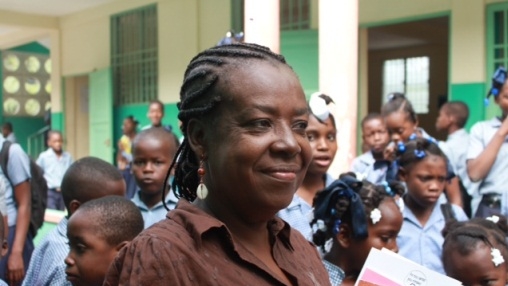Challenges
Haiti is one of the countries with the lowest school enrollment rate in the world. Nearly half a million children in Haiti did not attend school prior to the 2010 earthquake, which is believed to be equivalent to more than a quarter of all poor children between the age of 6 to 14.
With 84% of school teachers not qualified, the quality of education is poor. Children in grade three, on average read less than 23 words per minute and about 1 in 4 adult or youth cannot read and write. These challenges are compounded in rural areas by greater poverty and difficult access to schools.
In addition, the education system is predominantly private, which provides an additional barrier to access education. Over 80 percent of existing schools are private, and poor families at times spend up to 60 percent of their incomes on the schooling of their children.
Solution
To provide a sustainable mechanism for improved access to education and improved quality of education, the WB in partnership with IDB, CDB, CIDA and the Global Partnership for Education are funding the Education for All Project. This includes a tuition waiver program for almost 200,000 children in private schools in 8 of the 10 departments of Haiti.
The tuition waiver of 90 USD per student is conditioned on the provision of, a minimum of three textbooks per child, qualified teachers and improvement in the infrastructure and management of the school. The program also has a monitoring mechanism, which contracts independent auditing firms to verify enrollment every year.
In addition, to the tuition waivers program, the WB is also funding a school feeding program , which provides hot meals for over 80,000 children every day. The WB is also focusing on providing classroom-learning supports and performance-based incentives for schools to improve learning outcomes of students.
Results
The main results of the program are:
- Over 190,000 disadvantaged children in more than 900 schools are benefitting from tuition waivers.
- Over 80,000 students are receiving a breakfast snack, a hot lunch each day, as well as vitamin A, and deworming services.
- 63 community-based public schools are operating in four departments and the school management committees have been trained.
- Over 2,600 newly qualified teachers have been trained
- Teacher curriculum guide, reading program and teaching-learning tools are being developed with support from other donors.
- Over 2,800 private schools received a grant just after the earthquake enabling them to reopen so that children could go back to school
Bank Group Contribution
The Bank contributed USD 70 million through an IDA grant. It also manages the funds of the Global Partnership for Education of USD 22 million.
Beneficiaries
The project has improved access to education for over 190,000 children annually since 2007.

